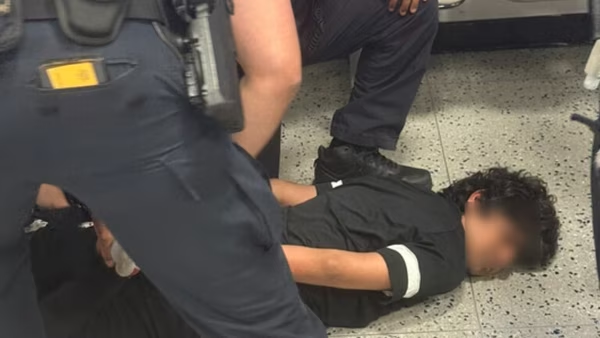A reflective exploration of the emotional conflict faced by individuals navigating dual identities—torn between compassion for their homeland and the demands of operating within a different system.Indian Student’s Deportation That Stirred My American This piece delves into the struggle between heart and mind, identity and responsibility, and asks how one can reconcile personal values with professional or societal expectations.

A few hours ago, while waiting to board my flight to Delhi from Newark Airport, I witnessed something that has left a deep and lasting mark on me. It wasn’t just a passing scene—it was a moment that shook me to the core, both as someone who carries India in my heart and as a U.S. citizen by passport.
Right in front of me, two officers were escorting a young Indian man onto the same flight. He appeared to be a student—disoriented, broken, and visibly resisting. Over and over, he pleaded in Hindi, “Main pagal nahi hoon… yeh log mujhe pagal sabit karna chahte hain.” (“I’m not insane… they’re trying to prove I’m mentally unstable.”) His eyes were wide with terror and disbelief. There was something haunting in his voice—an urgent cry to be seen, to be heard, to be understood by someone, anyone.
I stood motionless in the boarding line, unable to tear my eyes away. His wrists were bound, and at one point, both officers had to forcibly hold him down. I captured photos and video—not out of curiosity or spectacle—but because what I witnessed felt deeply wrong. It needed to be documented.
Then, something even more heartbreaking happened: the pilot stepped out, assessed the scene, and refused to let the young man board. Just like that, the moment passed for everyone else. But for me, it lingered. I boarded with a heavy heart, burdened by questions I couldn’t answer—shame, helplessness, and a sense of deep inner conflict.
After spending over 22 years in the United States—building businesses, creating jobs, and making this country my home—this moment shook me.
I felt like a bystander to my own conscience. My heart aches for India, but my reality is shaped by the systems of the U.S. In moments like these, I ask myself: What should I do? What should any of us do when our identity is split—when compassion clashes with compliance?
This wasn’t just about one person being deported. It felt like something larger—a shared failure of empathy and policy.
I thought of all the young Indian students who arrive in America with nothing but ambition and hope.
They often pay triple the tuition of domestic students, carrying their families’ dreams on their shoulders. Yet, if they don’t land a job quickly after graduation, their visas expire. They fall into a legal limbo—undocumented, unprotected, and uncertain about their future. They are no longer welcome here, and yet they have nowhere else to turn.
Table of Contents
You could hear it in his voice — the unmistakable accent of Haryana. Maybe his family sold land or took out loans to send him abroad, believing he was chasing his dreams. Maybe they still believe that. But instead, he was dragged out like a criminal — humiliated in public, treated like a threat.
And I have to ask: where is the support system meant to stand by him? What is the Indian embassy doing to uphold the dignity of our citizens in moments like this? Why does the U.S. system, which once welcomed him with open arms, suddenly turn cold when it matters most?
I don’t claim to have all the answers. But I know what I witnessed — and how it made me feel.
As someone who has worked to bridge these two nations, who has proudly promoted Indian talent and helped create jobs in America, I walked away from that airport feeling humiliated, angry, and heartbroken. That young man’s pain wasn’t just his own — it was a reflection of a deeper, systemic failure.
I hope we all take a moment to reflect. On immigration. On justice. On compassion. And on the kind of humanity we want to stand for — on both sides of the border.
READ ALSO……..Elon Musk Hints at Possible Reconciliation with Donald Trump After Recent Feuds 2025














 Categories
Categories








